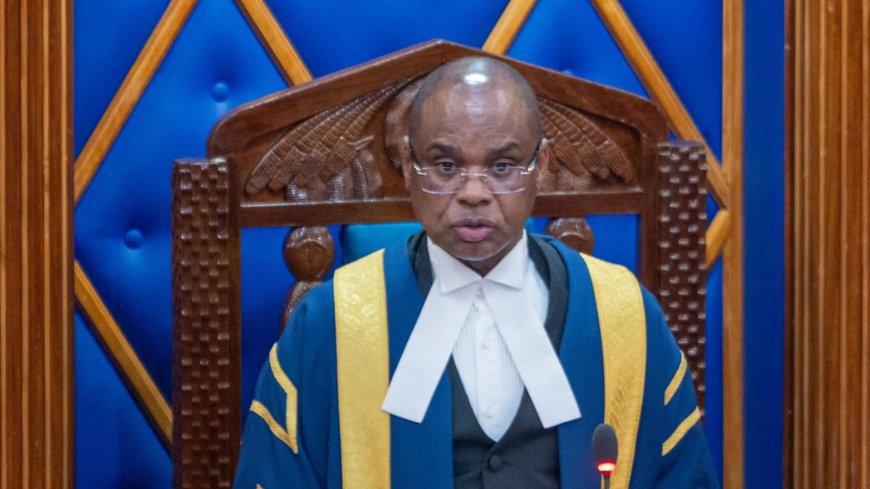Senate Suggests Rejecting Cherargei Proposal To Extend Term Limits
The Constitution of Kenya (Amendment) (No. 2) Bill, 2024, sponsored by Senator Cherargei, faced public opposition during the consultation phase, with 99.99 per cent of submissions expressing strong disapproval

The Senate Committee on Justice, Legal Affairs and Human Rights has recommended the rejection of a controversial bill that sought to extend the terms of elected officials, including presidents, from five to seven years, a significant blow to Nandi Senator Samson Cherargei.
The Constitution of Kenya (Amendment) (No. 2) Bill, 2024, sponsored by Senator Cherargei, faced public opposition during the consultation phase, with 99.99 per cent of submissions expressing strong disapproval, according to a statement from Parliament released on Friday, November 1.
"The voice of the Kenyan people has been unequivocal," declared Committee Chairperson Senator Hillary Wakili Sigei while presenting the report to the Senate plenary. "Out of 168,801 submissions received, only eleven stakeholders provided specific comments on the bill's clauses, while the rest overwhelmingly rejected the proposed amendments."
The bill, which proposed extending the terms of the President, Members of Parliament, Governors, and County Assembly Members, also sought to introduce the position of Prime Minister and modify the Senate's functions within the bicameral system.

Former President Uhuru Kenyatta hands over the instruments of power to Kenya's fifth President William Ruto at Kasarani Stadium. /TWITTER
"During our public hearing at the KICC Amphitheater on October 25, we witnessed an unprecedented show of unity among Kenyans," Sigei emphasized. "Save for one stakeholder, every single presenter urged the committee to reject this bill in its entirety."
The committee's decision was influenced not only by public opposition but also by procedural considerations. "We find ourselves in a position where even if some amendments proposed in the bill had merit, parliamentary practice and court decisions prevent us from severing the condemned provisions," Sen. Sigei explained.
"The Constitution demands that such amendments garner support from both the public and parliamentarians before passage."
Looking ahead, the committee has proposed significant procedural reforms. "We recommend that the Senate adopt stronger vetting mechanisms for constitutional amendment bills," stated Sigei, who added, "Specifically, we're calling for a requirement of at least 15 senators' signatures in support of any such proposal before it can be published as a bill."
The chairperson highlighted the financial implications of processing controversial constitutional amendments. "Subjecting bills to public participation incurs significant costs for Parliament. We must establish a proper sieving mechanism to ensure that proposals have reasonable support before advancing to this stage," he noted.
"This decision reflects our commitment to protecting both the spirit of our Constitution and the public interest," Sigei concluded, adding that Senators cannot proceed with amendments that face overwhelming opposition from the Kenyan people.
The fate of the Bill now rests in the hands of its sponsor, Cherargei, who retains the right to move it to the Second Reading despite the committee's rejection. For the bill to advance, President William Ruto's ally has to first secure a seconder for the motion, and then marshal sufficient support from his fellow Senators.
Without adequate backing from the Senate, the bill will not proceed to Second Reading and will effectively collapse at this stage.
Why It Matters
If the proposal contained in the Bill had been actualised it then meant that if one is elected president he or she would be in office for 7 years with the possibility of extension by another 7-year term.
Currently, Article 142 of the Kenyan 2010 Constitution indicates that: (1) The President shall hold office for a term beginning on the date on which the President was sworn in, and ending when the person next elected President in accordance with Article 136 (2) (a) is sworn in. The President, however, is prohibited from holding office for more than two five-year terms.
As of now, President Ruto is serving the first two years of his five-year term and is allowed to contest for another term in the 2027 general elections. However, if the Bill were to be passed before then, it would mean that should Ruto be re-elected in 2027, his second and final term would conclude in 2034.
The latest development came a few days after Cherargei stood firm on his proposal to extend the term limits, even claiming that the majority of Kenyans were in support of the Bill.
As of October 25, the Senate had received more than 200,000 submissions, which crashed its email system following the high number of views received from Kenyans.
“Senate has so far received 500,000 emails reacting to my Bill. As of now, 60 per cent of Kenyans are supporting my Bill and 40 per cent are opposing,” Cherargei revealed while speaking in the Senate on October 29. The ground however said otherwise.
“I have been a victim of a data breach for the last week, my phone has been called, and I have received insults and praises. As we speak today, my phone has over 12,000 messages, close to 20,000 WhatsApp messages. I have also received calls and there is a data privacy breach that no one is addressing,”







